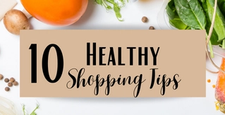Foods for a Healthy Heart
Cardiovascular disease accounts for one in four deaths in America, making it a major cause for concern in the United States. (1) The worldwide outlook is bleak, as cardiovascular disease is the number one death globally, according to the World Health Organization.
Luckily, we all have the ability to overcome these statistics. Lifestyle factors like diet and exercise are the most recognized preventive measures that one can take to avoid cardiovascular disease and enjoy heart health.
Healthy Eating for a Healthy Heart
Healthy eating is within everyone’s reach, no matter what your budget. While cravings certainly do make things more difficult, adding healthy habits into your daily diet can help make the overall transformation easier, as you replace unhealthy habits with healthier choices.
Here are some of the best foods to add to your healthy eating plan to protect your heart:
Berries – Raspberries, blueberries, blackberries, and strawberries are a delicious treat to add to yogurt, salads, and smoothies. Often called super fruits, these colorful foods are packed with antioxidants and enzymes that can help fight cardiovascular disease, among other things.
One exciting study led by Dr. Eric Rimm of Harvard School of Public Health and Harvard Medical School found that just three servings of ½ cup of strawberries or blueberries each week lowered the chance for heart attack. Berries are full of a compound called anthocyanins, that keep blood vessels elastic and help lower blood pressure.
Fatty Fish – Certain types of fish contain Omega-3 fatty acids that are widely known to lessen the risk of death due to cardiovascular disease. These fatty acids help reduce chronic internal inflammation, which can damage blood vessels and lead to heart disease. Consuming foods rich in Omega-3s also lessen the chance of blood clotting, decrease harmful triglycerides, and help stabilize an irregular heartbeat.
Fatty fish like salmon, cod, herring, sardines, lake trout, and light tuna contain the highest amounts of fatty acids and can greatly improve health when consumed twice a week. To double health benefits, replace two high-fat, red meat meals each week with a fatty fish and lessen the risk for heart disease even more.
Avocados – Avocados are often mistaken for being unhealthy due to their high-fat content. But the opposite is true because, like fish, they contain healthy fat that helps lower LDL, or bad cholesterol that can lead to heart disease.
One study published in the Journal of the American Heart Association found that participants who ate one avocado a day had the greatest reduction of LDL, thus lowering the risk for heart attack. And while not everyone will want to eat an avocado every day, they still provide health benefits when added to an overall heart-healthy diet.
Oats – Researchers have known the healthy heart benefits of oats for over a decade. But now, it seems they have more benefits than simply raising LDL or good cholesterol. Oats are a hearty fiber and an excellent grain for those who cannot tolerate wheat.
They help you feel full and maintain a healthy intestinal tract, which in turn promotes cardiovascular health. Oats are full of antioxidants that lower chronic internal inflammation, another risk factor for cardiovascular disease.
To include oats into your daily diet, try oatmeal for a quick and easy breakfast. Adding berries to your morning oats increases heart benefits even more. Oats can also be sprinkled on top of yogurt or used in home-made protein bars.
Whole Grains – Whole grains are an important source of fiber that can help reduce the risk of heart disease, stroke, and obesity. They are also packed with B vitamins that are important for blood oxygen, thyroid health, and strong immunity.
Even if you use a low carb diet, don’t shun grains altogether. Instead, include whole grains into your daily diet in small amounts, while avoiding refined grains that may cause digestive problems and weight gain. Some whole grains to look for include oats, wild rice, whole wheat, and whole-grain barley. If you purchase a whole-grain product, make sure the label uses the words “whole” or “whole grain.”
Nuts and Seeds – These little nutrition powerhouses can help reduce your risk of cardiovascular disease in a number of ways. First, they help lower LDL, the bad cholesterol, which can prevent arterial plaque buildup. They can also lower internal inflammation and reduce the risk of blood clots.
Nuts and seeds are packed with Omega-3 fats, vitamin E, dietary fiber, and L-arginine, all of which contribute to flexible arteries that can lower the risk of blockages that lead to a heart attack or stroke.
Enjoy a handful of nuts or seeds as a healthy snack, add some to your cereal or yogurt, or use as a protein source for a salad topping. A small handful four times each week will contribute to a healthy diet to protect your heart, according to the American Heart Association.
Garlic – While technically an herb, this powerful plant has been celebrated for its medicinal properties for centuries. In fact, the ancient Greek physician Hippocrates often prescribed garlic to treat a variety of health issues. Now, modern science proves he was right.
One study indicated garlic prevents oxidative damage and reduces blood pressure. Another study published in the Pakistani Journal of Pharmaceutical Sciences showed that garlic significantly reduced systolic and diastolic blood pressure, while even more research found that garlic powder tablets used in a double-blind, placebo-controlled randomized study significantly reduced bad cholesterol while raising healthy cholesterol. (2,3)
Conclusion
Begin today to make small changes in your diet for better heart health. Avoid junk food and replace it with the above healthy foods, limit alcohol intake, and exercise at least three times each week. Small lifestyle changes like these will easily add up so you can enjoy better health at any age.
References:
1 Benjamin EJ, Muntner P, Alonso A, Bittencourt MS, Callaway CW, Carson AP, et al. Heart disease and stroke statistics—2019 update: a report from the American Heart Association. Circulation. 2019;139(10):e56–528.
2 Ried K, Frank OR, Stocks NP. Aged garlic extract lowers blood pressure in patients with treated but uncontrolled hypertension: a randomised controlled trial. Maturitas. 2010;67(2):144-150. doi:10.1016/j.maturitas.2010.06.001
3 Sobenin IA, Andrianova IV, Demidova ON, Gorchakova T, Orekhov AN. Lipid-lowering effects of time-released garlic powder tablets in double-blinded placebo-controlled randomized study. J Atheroscler Thromb. 2008;15(6):334-338. doi:10.5551/jat.e550



















